Local governments often require private property owners to provide public parking as a condition of obtaining a building permit. For people looking for a convenient place to park, this might seem like a reasonable requirement. For small business owners, churches, families and others trying to make reasonable use of their property, parking mandates are another onerous government regulation they are forced to overcome.
A bill to prohibit local governments in Minnesota from mandating parking is under consideration in the coming legislative session. At stake isn’t whether or not there will be parking in our cities — there will be — but who gets to decide how much parking there is.
Should local government bureaucrats and unelected planning boards make that determination? Should they decide and then force others to provide the amount of parking they determine proper, without any compensation? That is what happens now in most of Minnesota’s cities, in nearly all of our suburbs, small towns and rural areas.
Or, should a business owner, homeowner, church, school, or other private property owner be allowed to determine for themselves how much parking they need? Every day in Minnesota, small businesses have expansions stifled, home builders are forced to change their plans, and civic institutions scale back their ambitions, all because of government parking mandates.
These mandates might be defensible if local governments had taken the time to research and thoroughly understand how much parking their individual market demands. Of course, that isn’t what happened. Decades ago, the state of Minnesota, at the urging of the federal government, codified best zoning practices for cities, including parking mandates. If a city wanted funding for an infrastructure project, they improved their odds by adopting these best practices.
Zoning codes with progressive parking mandates proliferated. Cities copied the parking codes of other cities, without any regard to their local applicability. Standards that were originally developed for California suburbs in the 1950s can now be found in the most rural of Minnesota cities. There, out of sight to most of us, they do great harm.
So, if parking mandates are so harmful, why don’t cities repeal these codes on their own? Many have, but there are two major obstacles. First, let’s face it, most of us like free parking. It is enticing to force others to provide the parking we want at seemingly no charge. Mayors and city council members are reluctant to appear to take away a freebie many people enjoy, even if it’s the right thing to do.
Second, and more importantly, local governments value the power that arbitrary parking mandates provide. The Supreme Court, in repeated opinions written by the late Justice Antonin Scalia, severely limited the power of local government in zoning matters. Parking mandates are a way for cities to circumvent those rulings, negotiating down these arbitrary requirements in exchange for other “voluntary” concessions.
It’s time for Minnesota to limit the power of local governments to mandate parking requirements. Private property owners should not have to provide public parking as a condition of obtaining a building permit. They can build parking if they want, and many will, but local governments should not be allowed to mandate a minimum number of spaces. This is the rare public policy issue that both political parties can and should agree on.
Charles Marohn — known as “Chuck” to friends and colleagues — is the founder and president of Strong Towns. He is a land use planner and civil engineer with decades of experience. He holds a bachelor’s degree in civil engineering and a Master of Urban and Regional Planning, both from the University of Minnesota.
Charles Marohn
Charles Marohn — known as “Chuck” to friends and colleagues — is the founder and president of Strong Towns. He is a land use planner and civil engineer with decades of experience. He holds a bachelor’s degree in civil engineering and a Master of Urban and Regional Planning, both from the University of Minnesota.
Marohn is the author of "Strong Towns: A Bottom-Up Revolution to Rebuild American Prosperity" (Wiley, 2019) and "Confessions of a Recovering Engineer: Transportation for a Strong Town" (Wiley 2021). He hosts the Strong Towns Podcast and is a primary writer for Strong Towns’ web content. He has presented Strong Towns concepts in hundreds of cities and towns across North America.













